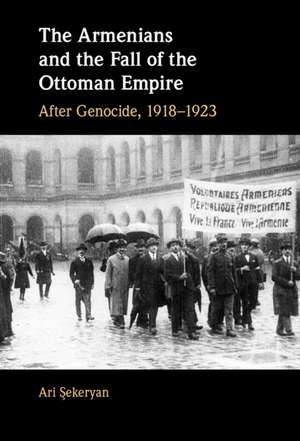The Armenians and the Fall of the Ottoman Empire: After Genocide, 1918–1923
Autor Ari Şekeryanen Limba Engleză Hardback – 18 ian 2023
Preț: 529.87 lei
Preț vechi: 575.95 lei
-8% Nou
Puncte Express: 795
Preț estimativ în valută:
101.39€ • 107.08$ • 84.38£
101.39€ • 107.08$ • 84.38£
Carte disponibilă
Livrare economică 23 decembrie 24 - 06 ianuarie 25
Livrare express 07-13 decembrie pentru 33.27 lei
Preluare comenzi: 021 569.72.76
Specificații
ISBN-13: 9781108844017
ISBN-10: 1108844014
Pagini: 200
Dimensiuni: 152 x 229 x 16 mm
Greutate: 0.52 kg
Editura: Cambridge University Press
Colecția Cambridge University Press
Locul publicării:Cambridge, United Kingdom
ISBN-10: 1108844014
Pagini: 200
Dimensiuni: 152 x 229 x 16 mm
Greutate: 0.52 kg
Editura: Cambridge University Press
Colecția Cambridge University Press
Locul publicării:Cambridge, United Kingdom
Cuprins
List of Figures; List of Tables; List of Maps; Acknowledgements; Notes on Language; Introduction; 1. End of the Great War; 2. The Emergence of the Turkish National Movement in Anatolia and the Armenian Community; 3. The French Occupation in Cilicia and the Turkish-Armenian War in the Causcaus; 4. The Transformation of the Armenian Political Position; Conclusion; Appendix; Bibliography.
Recenzii
'This is truly a sophisticated interdisciplinary approach to the fate of the Armenians during a critical phase of history. Ari Şekeryan masterfully reconstructs the history of the Armenians of the Empire. This study contributes not only to understanding the mindset of the composite Armenian community of the Empire, but also to the literature of behavior of minority groups in post-war periods.' Bedross Der Matossian, University of Nebraska
'This intelligent, original book will be of great interest to scholars of Armenian and Turkish history and anyone working in genocide studies. In fine detail, it reveals the terrible dilemmas facing the remnants of a community shattered by genocidal destruction, as they tried to negotiate a future amid great power politicking and the ascent of a Turkish nationalist movement with strong continuities to the regime that had recently perpetrated the genocide.' Donald Bloxham, University of Edinburgh
'This excellent analysis, based on primary sources, argues for taking a processual approach from a nationalist to an accommodationist political stand in relation to Western powers and the Turkish ethnic majority. A must-read for all scholars working on the political analysis of minority survival through uncertain times.' Fatma Müge Göçek, University of Michigan
'In this splendid work, Ari Şekeryan takes a hard look at the fraught fate of the surviving Armenians in the late Ottoman Empire and early Turkish Republic. The author demonstrates the strategic adaptability of a vulnerable population, its reluctant choices, and its resilience as a community in a state that often considered (and still considers) the Armenians to be an existential threat to the Turkish nation.' Ronald Grigor Suny, University of Chicago and University of Michigan
'This excellent study fills a major lacuna in the historiography of this period. Şekeryan demonstrates the tension and conflict within the diverse Armenian communities in a critical period of transition and insecurity. This multi-sited historical analysis is at once panoptic and penetrating, elucidating the dilemmas faced by the Ottoman Armenians in the twilight of empire.' Uğur Ümit Üngör, University of Amsterdam
'This intelligent, original book will be of great interest to scholars of Armenian and Turkish history and anyone working in genocide studies. In fine detail, it reveals the terrible dilemmas facing the remnants of a community shattered by genocidal destruction, as they tried to negotiate a future amid great power politicking and the ascent of a Turkish nationalist movement with strong continuities to the regime that had recently perpetrated the genocide.' Donald Bloxham, University of Edinburgh
'This excellent analysis, based on primary sources, argues for taking a processual approach from a nationalist to an accommodationist political stand in relation to Western powers and the Turkish ethnic majority. A must-read for all scholars working on the political analysis of minority survival through uncertain times.' Fatma Müge Göçek, University of Michigan
'In this splendid work, Ari Şekeryan takes a hard look at the fraught fate of the surviving Armenians in the late Ottoman Empire and early Turkish Republic. The author demonstrates the strategic adaptability of a vulnerable population, its reluctant choices, and its resilience as a community in a state that often considered (and still considers) the Armenians to be an existential threat to the Turkish nation.' Ronald Grigor Suny, University of Chicago and University of Michigan
'This excellent study fills a major lacuna in the historiography of this period. Şekeryan demonstrates the tension and conflict within the diverse Armenian communities in a critical period of transition and insecurity. This multi-sited historical analysis is at once panoptic and penetrating, elucidating the dilemmas faced by the Ottoman Armenians in the twilight of empire.' Uğur Ümit Üngör, University of Amsterdam
Notă biografică
Descriere
Explores the political and social life of the Armenian community in the Ottoman Empire during the post-war period.
